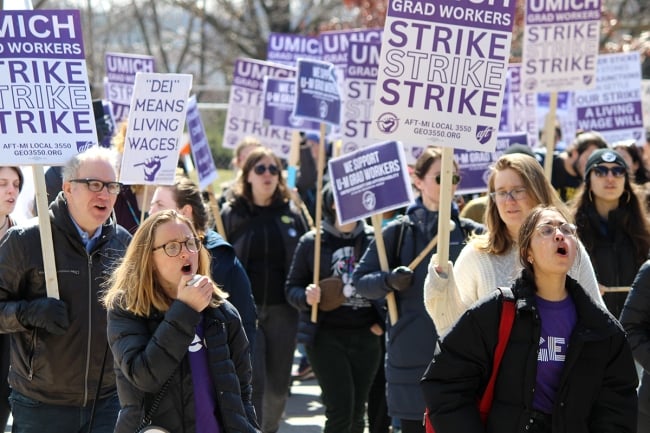You have /5 articles left.
Sign up for a free account or log in.

The University of Michigan graduate student workers’ strike began March 29.
Graduate Employees’ Organization
The University of Michigan and a union of graduate student instructors and staff assistants have signed a tentative agreement that could prevent a strike from restarting when classes for the fall term begin Monday.
The deal includes minimum pay increases for workers on the Ann Arbor, Dearborn and Flint campuses—though the Ann Arbor flagship campus’s increases are larger—and a bevy of other wins. Those include, for all three campuses, one-time $1,000 bonuses, maternity leave equivalent to what tenured and tenure-track faculty receive, and improved health-care coverage for the treatment of gender dysphoria—the distress caused by an incongruence between one’s birth-assigned sex and gender identity.
On March 29, Graduate Employees’ Organization (GEO) members began a strike that was illegal under both state law and the union’s collective bargaining agreement with the university. The union, affiliated with the American Federation of Teachers, didn’t reveal back then how many people were taking part, and the university said it doesn’t have that information “collected centrally.”
“We honestly don’t have exact numbers” for how many grad students went on strike, GEO spokesperson Amir Fleischmann said Tuesday. “We do know the university withheld pay from over 900 workers in April.” Michigan has around 2,300 graduate student instructors and staff assistants, of whom about 1,300 are regular dues-paying GEO members, Fleischmann said.
The Michigan strike joined a wave of faculty member strikes in other states during the spring. At first, the university pursued ineffectual legal maneuvers to force the Michigan strikers back to work. On May 1, the union’s collective bargaining agreement with the university expired.
Some strikers’ refusal to turn in grades for the spring semester led a few department chairs to say they planned to give students A’s out of a lack of other options. Graduate students are instructors of record for some Michigan classes.
Fleischmann, who’s a political science Ph.D. candidate, said those strikers never turned in grades for the spring classes. But summer grad student instructors did teach and grade, meaning they effectively weren’t striking, he said.
When asked whether the strike might have resumed next week if there was no tentative deal, he said, “Everything was on the table.”
“The fall term starts on Monday, and I think the university bosses wanted to have a little bit of certainty going into it,” he said. “They came to us again and again with better offers.”
The full union membership is still casting ballots through Friday on whether to accept the agreement. But Fleischmann said the membership was made aware of what would be in the proposal before it voted Monday and Tuesday to authorize the union bargaining team to sign the tentative agreement, setting up the current vote.
The deal, a copy of which Fleischmann provided to Inside Higher Ed, says the minimum annual salaries of $24,000 on the Ann Arbor flagship campus will rise 8 percent Monday, another 6 percent next academic year and a further 6 percent in the proposed contract’s third and final year.
The union had been seeking a 60 percent overall increase for both master’s and doctoral degree–seeking students, to reach about $38,500. But about 70 percent of the union members are Ph.D. students, according to Fleishmann, and a couple of weeks before the strike began, the university said it would move them onto a 12-month pay basis (the “Rackham (Graduate School) plan”)—effectively increasing their annual salary from the minimum $24,000 for two semesters with no summer pay to $36,000, close to the union’s goal even before the strike began.
That level of pay increase “is still only for Ph.D.s,” not master’s degree students, Fleischmann said. “But I think it’s pretty clear that this is a result of us organizing for a strike.”
Combined with the proposed new contract’s raises, the pay level would well exceed the 60 percent goal, at least for Ph.D. students. Not only that, but Fleischmann said the union’s contract effectively establishes a minimum salary for Ph.D. student classifications, including graduate student research assistants, that aren’t represented by the union.
“By getting the Rackham plan in the contract and by getting [sexual] harassment protections for all graduate students, we forced the university to acknowledge that we represent all Ph.D.s on this campus, and that’s what these negotiations were about,” Fleischmann said.
University of California graduate student workers earned various advances through their historic strike last year—achieving nine-month minimums like $36,500 for teaching assistants on the Berkeley, San Francisco and Los Angeles campuses. But that strike didn’t achieve its earlier goal of stipends closer to $54,000. (Note: This paragraph has been updated to clarify that these minimums did not include summer pay.)
Rick Fitzgerald, a Michigan spokesman, said the Rackham plan has “been in the works for a number of years.”
“The Rackham plan is not part of the GEO contract; it’s a support for Ph.D. students but is not part of the GEO contract,” Fitzgerald said. Fleischmann said the university promised the Rackham plan in a “side letter,” outside the contract, but reiterated his belief that the concession was won amid pressure from the impending strike.
Fitzgerald said the university was pleased to reach an agreement. “I think it’s important that we’re on a trajectory to having a ratified contract in place before the start of the academic term on Monday,” Fitzgerald said.
In a news release Tuesday, Evelyn Smith, an economics Ph.D. candidate and GEO’s lead negotiator, said, “The offer on the table contains historic wins. The administration wants to take credit for these wins, but we know it wasn’t their generosity that got us here, but the power of an unprecedented member-driven long-haul strike. Regardless of the outcome of the ratification vote, one thing is certain: Our fight will continue long after this contract is settled.”




